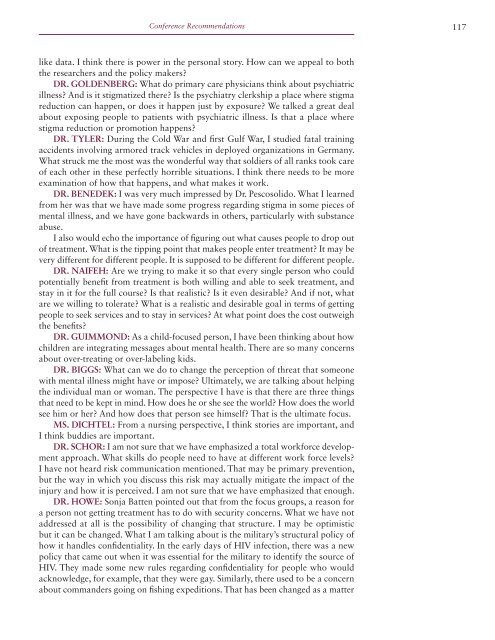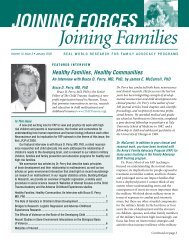stigma and barriers to care - Uniformed Services University of the ...
stigma and barriers to care - Uniformed Services University of the ...
stigma and barriers to care - Uniformed Services University of the ...
You also want an ePaper? Increase the reach of your titles
YUMPU automatically turns print PDFs into web optimized ePapers that Google loves.
Conference Recommendations 117<br />
like data. I think <strong>the</strong>re is power in <strong>the</strong> personal s<strong>to</strong>ry. How can we appeal <strong>to</strong> both<br />
<strong>the</strong> researchers <strong>and</strong> <strong>the</strong> policy makers<br />
DR. GOLDENBERG: What do primary <strong>care</strong> physicians think about psychiatric<br />
illness And is it <strong>stigma</strong>tized <strong>the</strong>re Is <strong>the</strong> psychiatry clerkship a place where <strong>stigma</strong><br />
reduction can happen, or does it happen just by exposure We talked a great deal<br />
about exposing people <strong>to</strong> patients with psychiatric illness. Is that a place where<br />
<strong>stigma</strong> reduction or promotion happens<br />
DR. TYLER: During <strong>the</strong> Cold War <strong>and</strong> first Gulf War, I studied fatal training<br />
accidents involving armored track vehicles in deployed organizations in Germany.<br />
What struck me <strong>the</strong> most was <strong>the</strong> wonderful way that soldiers <strong>of</strong> all ranks <strong>to</strong>ok <strong>care</strong><br />
<strong>of</strong> each o<strong>the</strong>r in <strong>the</strong>se perfectly horrible situations. I think <strong>the</strong>re needs <strong>to</strong> be more<br />
examination <strong>of</strong> how that happens, <strong>and</strong> what makes it work.<br />
DR. BENEDEK: I was very much impressed by Dr. Pescosolido. What I learned<br />
from her was that we have made some progress regarding <strong>stigma</strong> in some pieces <strong>of</strong><br />
mental illness, <strong>and</strong> we have gone backwards in o<strong>the</strong>rs, particularly with substance<br />
abuse.<br />
I also would echo <strong>the</strong> importance <strong>of</strong> figuring out what causes people <strong>to</strong> drop out<br />
<strong>of</strong> treatment. What is <strong>the</strong> tipping point that makes people enter treatment It may be<br />
very different for different people. It is supposed <strong>to</strong> be different for different people.<br />
DR. NAIFEH: Are we trying <strong>to</strong> make it so that every single person who could<br />
potentially benefit from treatment is both willing <strong>and</strong> able <strong>to</strong> seek treatment, <strong>and</strong><br />
stay in it for <strong>the</strong> full course Is that realistic Is it even desirable And if not, what<br />
are we willing <strong>to</strong> <strong>to</strong>lerate What is a realistic <strong>and</strong> desirable goal in terms <strong>of</strong> getting<br />
people <strong>to</strong> seek services <strong>and</strong> <strong>to</strong> stay in services At what point does <strong>the</strong> cost outweigh<br />
<strong>the</strong> benefits<br />
DR. GUIMMOND: As a child-focused person, I have been thinking about how<br />
children are integrating messages about mental health. There are so many concerns<br />
about over-treating or over-labeling kids.<br />
DR. BIGGS: What can we do <strong>to</strong> change <strong>the</strong> perception <strong>of</strong> threat that someone<br />
with mental illness might have or impose Ultimately, we are talking about helping<br />
<strong>the</strong> individual man or woman. The perspective I have is that <strong>the</strong>re are three things<br />
that need <strong>to</strong> be kept in mind. How does he or she see <strong>the</strong> world How does <strong>the</strong> world<br />
see him or her And how does that person see himself That is <strong>the</strong> ultimate focus.<br />
MS. DICHTEL: From a nursing perspective, I think s<strong>to</strong>ries are important, <strong>and</strong><br />
I think buddies are important.<br />
DR. SCHOR: I am not sure that we have emphasized a <strong>to</strong>tal workforce development<br />
approach. What skills do people need <strong>to</strong> have at different work force levels<br />
I have not heard risk communication mentioned. That may be primary prevention,<br />
but <strong>the</strong> way in which you discuss this risk may actually mitigate <strong>the</strong> impact <strong>of</strong> <strong>the</strong><br />
injury <strong>and</strong> how it is perceived. I am not sure that we have emphasized that enough.<br />
DR. HOWE: Sonja Batten pointed out that from <strong>the</strong> focus groups, a reason for<br />
a person not getting treatment has <strong>to</strong> do with security concerns. What we have not<br />
addressed at all is <strong>the</strong> possibility <strong>of</strong> changing that structure. I may be optimistic<br />
but it can be changed. What I am talking about is <strong>the</strong> military’s structural policy <strong>of</strong><br />
how it h<strong>and</strong>les confidentiality. In <strong>the</strong> early days <strong>of</strong> HIV infection, <strong>the</strong>re was a new<br />
policy that came out when it was essential for <strong>the</strong> military <strong>to</strong> identify <strong>the</strong> source <strong>of</strong><br />
HIV. They made some new rules regarding confidentiality for people who would<br />
acknowledge, for example, that <strong>the</strong>y were gay. Similarly, <strong>the</strong>re used <strong>to</strong> be a concern<br />
about comm<strong>and</strong>ers going on fishing expeditions. That has been changed as a matter




